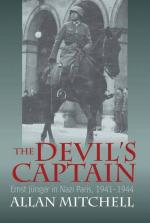|
This section contains 6,713 words (approx. 23 pages at 300 words per page) |

|
SOURCE: "Ernst Jünger: Literature, Warfare and the Intoxication of Philosophy," in Mosaic, Vol. XIX, No. 4, Fall, 1986, pp. 107-19.
In the following essay, Bullock explores Jünger's ideas about the use of drugs and intoxication in intellectual thought.
When the editors of Mircea Eliade's Festschrift of 1969 at the University of Chicago Press asked Ernst Jünger to contribute an essay on the use of drugs as an agency in the exploration of human consciousness, their choice reflected the general recognition of a place to which he has long held undisputed claim in Europe. He is without doubt the most solidly established and authoritative literary voice on that continent to continue the tradition of Baudelaire, E. T. A. Hoffmann, Poe and Coleridge by making the experience of drugs and intoxication central to the world he investigates. The association between Jünger and Eliade had, of course, been active for...
|
This section contains 6,713 words (approx. 23 pages at 300 words per page) |

|


